|
As we approach the election we thought we would complete this series on Trump and Economics in the Gospels first begun in 2017. 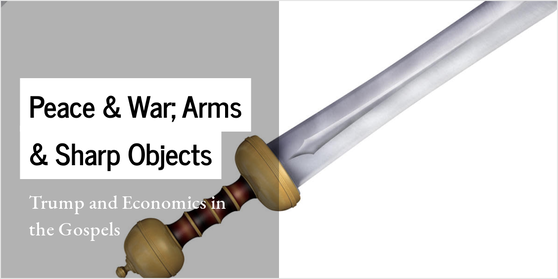 President Trump is given high marks by his supporters for keeping America out of any new wars and overseeing the defeat of Isis. He is also credited with overseeing an increase in military spending and broadening peace between Israel and the Arab world. Christ never commanded any legions though that was apparently by choice. Matthew 26:53 Or do you think that I cannot call on my Father, and that he would send me more than twelve legions of angels right now. Paradoxically the “Prince of Peace” said that He wasn’t here to bring peace at all. Can we see Trump in the following? Luke 12:51 Do you think I have come to bring peace on earth? No, I tell you, but rather division! 12:52 For from now on there will be five in one household divided, three against two and two against three. 12:53 They will be divided, father against son and son against father, mother against daughter and daughter against mother, mother-in-law against her daughter-in-law and daughter-in-law against mother-in-law.” Obviously, an arms industry was vital to the expanse and defense of the Pax Romana in Christ’s time, requiring the outfitting of armed forces throughout the empire. Not so different for the realms of today; and, as in Roman times, we find the use of shackles and chains to subdue the furious and violent. Mark 5:4 For his hands and feet had often been bound with chains and shackles, but he had torn the chains apart and broken the shackles in pieces. No one was strong enough to subdue him. Trump’s time will be stained by the use of clubs and armor to quell social unrest, swelling the Black Lives Matter movement. Mark 14:43 Right away, while Jesus was still speaking, Judas, one of the twelve, arrived. With him came a crowd armed with swords and clubs, sent by the chief priests and experts in the law and elders 14:47 One of the bystanders drew his sword and struck the high priest’s slave, cutting off his ear. 14:48 Jesus said to them, “Have you come with swords and clubs to arrest me like you would an outlaw? Christ would not only have been familiar with such scenes, but the cause of them. “Good Trouble” perhaps in the words of John Lewis, an enduring presence in society’s search for elusive peace at home in Trump’s time.
0 Comments
As we approach the election we thought we would complete this series on Trump and Economics in the Gospels first begun in 2017. 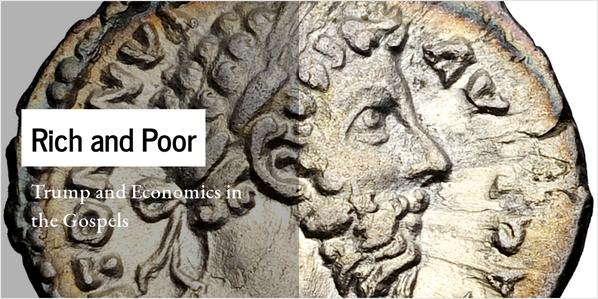 Much of what the Gospels speak to surrounds the haves, and the have-nots. References abound both in direct and indirect mentions of the disadvantages the rich will have, and the relative advantages the poor will receive. Mark 10:31 But many who are first will be last, and the last first.” Where’s Trump in these passages? Obviously, being poor is not generally associated with him. To the contrary his persona is the opposite: he is rich. One of the most famous passages of all is Jesus stating what seems the most empirically provable statement he ever uttered. No matter the economic system this holds true to today. Matthew 26:11 For you will always have the poor with you, but you will not always have me! Many times in the Gospels it is stated that the poor will receive a reward in the afterlife. As we move along in Larazus’ story we get more of what the Gospels have to say on the relative situation between rich and poor; it is not a pretty picture. Luke 16:22 “Now the poor man died and was carried by the angels to Abraham’s side. The rich man also died and was buried. 16:23 And in hell, as he was in torment, he looked up and saw Abraham far off with Lazarus at his side. 16:24 So he called out, ‘Father Abraham, have mercy on me, and send Lazarus to dip the tip of his finger in water and cool my tongue, because I am in anguish in this fire.’ 16:25 But Abraham said, ‘Child, remember that in your lifetime you received your good things and Lazarus likewise bad things, but now he is comforted here and you are in anguish. It’s not all bad for the rich. There are several instances where rich folk are seen in a good light. Matthew 27:57 Now when it was evening, there came a rich man from Arimathea, named Joseph, who was also a disciple of Jesus. 27:58 He went to Pilate and asked for the body of Jesus. Then Pilate ordered that it be given to him.. But generally, being rich is seen as a disadvantage, as in this famous passage about the camel and fitting through the eye of a needle. Mark 10:23 Then Jesus looked around and said to his disciples, “How hard it is for the rich to enter the kingdom of God!” 10:24 The disciples were astonished at these words. But again Jesus said to them, “Children, how hard it is to enter the kingdom of God! 10:25 It is easier for a camel to go through the eye of a needle than for a rich person to enter the kingdom of God.” 10:26 They were even more astonished and said to one another, “Then who can be saved?” 10:27 Jesus looked at them and replied, “This is impossible for mere humans, but not for God; all things are possible for God.” And this in Luke… Luke 6:24 “But woe to you who are rich, for you have received your comfort already. Inheritance is one of the predominant themes throughout the entire Bible, and the Gospels are no exception. One might wonder from the following famous passage what the non-meek will inherit. Matthew 5:5 “Blessed are the meek, for they will inherit the earth. Of course, Trump is famous for an inheritance of a different kind. 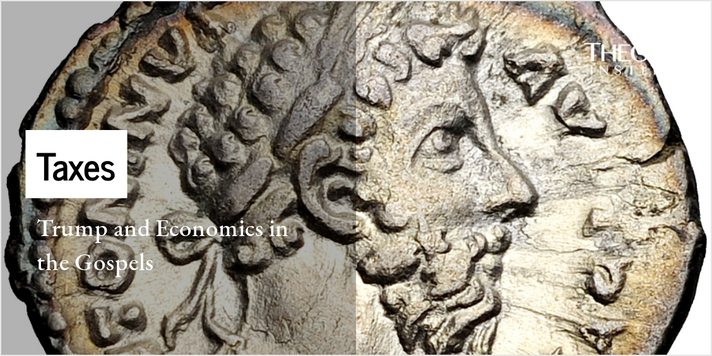 Taxes play an intriguing role throughout the Gospels. References are made to tax booths and a top disciple Matthew was a reviled tax collector. Their frequent mention supports the old adage about them and death. Trump and taxes are famously tied in several ways. There was also a robust system of taxation and government spending in Jesus’ time as we can see from the mention of the census being taken to support tax collection. Luke 2:1 Now in those days a decree went out from Caesar Augustus to register all the empire for taxes. As President, Trump is a fundamental player when it comes to implementing fiscal policy for the entire country. His top legislative accomplishment was a tax overhaul that favored tax breaks for the wealthy and corporations, in search of improved economic growth. A trickle-down sort of supply side policy that was actually showing some results before the pandemic hit. The increased debt resulting from these policies is a byproduct of taxes being lower and spending higher for all kinds of programs including defense. Trump’s tax policies were producing higher and accelerating deficit levels even before the pandemic, which has caused it to explode to previously unimaginable levels. It’s not clear how much debt Rome utilized and there doesn’t seem to be mention of government debt per se. Trump has also used tariffs, and their threat, to cudgel friends and foes alike, most notably China. Tariffs were similarly collected by Roman authorities when goods entered the empire. There are no tax returns mentioned in the Gospels, though tax collecting, and, presumably, their associated records were. Trump’s tax returns are infamous for having never been released and constantly speculated over – with audits and legal suits ongoing. Tribute Tax (2) The tax to Caesar received memorable ink in the Gospels. Luke 23:2 They began to accuse him, saying, “We found this man subverting our nation, forbidding us to pay the tribute tax to Caesar and claiming that he himself is Christ, a king.” Paying Taxes to Caesar Matthew 22:15 Then the Pharisees went out and planned together to entrap him with his own words. 22:16 They sent to him their disciples along with the Herodians, saying, “Teacher, we know that you are truthful, and teach the way of God in accordance with the truth. You do not court anyone’s favor because you show no partiality. 22:17 Tell us then, what do you think? Is it right to pay taxes to Caesar or not?” 22:18 But Jesus realized their evil intentions and said, “Hypocrites! Why are you testing me? 22:19 Show me the coin used for the tax.” So they brought him a denarius. 22:20 Jesus said to them, “Whose image is this, and whose inscription?” 22:21 They replied, “Caesar’s.” He said to them, “Then give to Caesar the things that are Caesar’s, and to God the things that are God’s.” 22:22 Now when they heard this they were stunned, and they left him and went away. Tax (5) There is little objection to taxes in the Gospels – they appear to be an accepted fact of life – just like today. Though there is a reference to them needing to be fair… Luke 3:13 He told them, “Collect no more than you are required to.” And the efficient collection of taxes appears to have inspired census taking. Luke 2:1 Now in those days a decree went out from Caesar Augustus to register all the empire for taxes. Temple Tax / Double Drachma TaxTaxes were collected at the temple. Though it would appear that Jesus might feel he is exempt… Matthew 17:24 After they arrived in Capernaum, the collectors of the temple tax came to Peter and said, “Your teacher pays the double drachma tax, doesn’t he?” 17:25 He said, “Yes.” When Peter came into the house, Jesus spoke to him first, “What do you think, Simon? From whom do earthly kings collect tolls or taxes – from their sons or from foreigners?” 17:26 After he said, “From foreigners,” Jesus said to him, “Then the sons are free. Wouldn’t Trump love that idea? Wouldn’t we all… As we approach the election we thought we would complete this series on Trump and Economics in the Gospels first began in 2017. 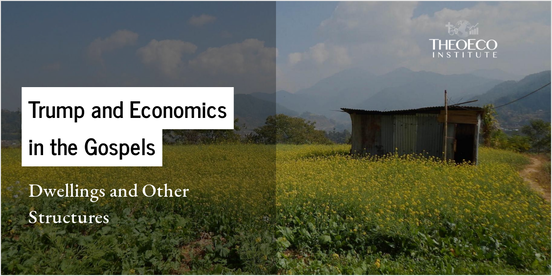 The Gospels are full of houses. They are mentioned seemingly at all times and in all books. The disciples had them. Jesus’ friends had them, as did his enemies. Everyone but Jesus himself seemed to have one. Luke 9:58 Jesus said to him, “Foxes have dens and the birds in the sky have nests, but the Son of Man has no place to lay his head.” One might think Trump would be well represented in these passages given his profession as a builder – and indeed he is! Trump is famous for his dwellings – and achieved much of his wealth through their building. He currently lives in perhaps the most famous house of them all: The White House. Building homes is the family business, though the Trumps have certainly diversified. This particular section of Trump and Economics in the Gospels study seems, therefore, particularly prescient somehow. From an economics standpoint it would seem pretty obvious that homebuilding, like today, was a cornerstone of economic activity in the Roman economy. As is seen in the chapters on labor and produced goods it is also apparent that tools and jobs were abundant in the home building sector, if you will. Lastly, the Gospels never seem to disparage the owner of a home for owning it, as one might expect given the statements that one should sell everything and give to the poor. Houses seem to be exempt. Folks gotta live somewhere after all. In addition to housing, there was a lot of other building going on back in the days of the Gospels. Synagogues, tombs, prisons, barns – there’s quite a list. Perhaps the most famous structures in the Gospels are the manger and inn. Luke 2:7 …and laid him in a manger, because there was no place for them in the inn. One might wonder: Would there be room at a Trump hotel? As we approach the election we thought we would complete this series on Trump and Economics in the Gospels first began in 2017. 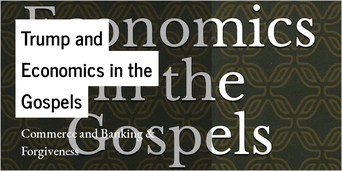 Not surprisingly, borrowing and lending are well represented in the Gospels, and would put the world economic order on its head if followed to the letter. Matthew 5:42 Give to the one who asks you, and do not reject the one who wants to borrow from you. Trump supporters generally point to the economy as one of his top accomplishments over the past four years and why they voted for him to begin with. They point to his China policy, deregulation, manufacturing, jobs, and commerce in general. Unfortunately for Trump apologists GDP growth, employment, deficits, and the national debt, have all taken big hits under his term; much caused by the pandemic, some not. Of course, modern economic policy and tools didn’t exist in Roman times - no printing presses printing trillions of drachmas in Caesar’s basement - though taxation and debt certainly did. Without credit and debt, the modern economic system would be unrecognizable. So much more debt to foster so much more commerce. 2.000 years later can we see the derivative effects on our ecology from these passages? Commerce and the environment rarely seem to benefit harmoniously. Forgiveness seems like a rather quaint concept that has little reality in a business or economic context. But forgiveness of debts is commonplace. Just declare bankruptcy, accept the drop in your credit rating, and move on, as many are today. It is also normal for countries and large economic enterprises to turn the other cheek, so long as there are economic payoffs in doing so. Luke 6:35 But love your enemies, and do good, and lend, expecting nothing back. Then your reward will be great, and you will be sons of the Most High, because he is kind to ungrateful and evil people. Lend and expect nothing back? In many ways our laws actually inculcate these Gospel teachings…and Trump has taken full advantage. As a real estate developer, he certainly borrows lots of money, at least through his companies. And his business failures have shown that the legal system often allows debts to be excused – and forgiven nonpayers to come out smelling like roses – and still rich. In fact, Trump’s experience with bankruptcy law was sighted as a good reason to vote for him in the first place by many. 6:12 and forgive us our debts, as we ourselves have forgiven our debtors. As we approach the election we thought we would complete this series on Trump and Economics in the Gospels first began in 2017. Would Jesus love capitalists? This is a trick question - He loved everybody. Furthermore, according to the Gospels He spent considerable time with friends in low places including the hated “tax collectors”, publicans, sinners, and other dregs of His society, so certainly capitalists would presumably have made the grade.
That being said, and unfortunately for an MBA holding, small business Capitalist like me, a review of the four books of the Gospels (Mathew, Mark, Luke and John) in the New Testament, present alarmingly meager support for capitalism, at least not in terms that a modern day business person, financier, entrepreneur, etc., can confidently hang their hat on. There is nothing that can be attributed to Jesus saying anything along the lines of “build businesses and maximize profits” though there is the occasional hopeful passage such as: For whoever has will be given more, but whoever does not have, even what he has will be taken from him.” Mark 4:25 On the other hand, as we’ll see in this chapter especially, Jesus is quoted as saying any number of things that are at odds with capitalist outcomes and doctrines such as: Sell your possessions and give to the poor. Provide yourselves purses that do not wear out – a treasure in heaven that never decreases, where no thief approaches and no moth destroys. Luke 12:23 So, when it comes to Donald Trump, we can assume that Jesus would love him just like anyone else and that His admonitions regarding the wealthy would likely apply. And given Trump’s fame as a TV star known for apprentices craving his management skills, this seems an especially appropriate chapter in the Trump and Economics in the Gospels study first posted in March 2018… Management (Jesus’ Instructions)Probably the “toughest” section of this book for people to take is this one as it contains the unvarnished instructions of the boss of the Gospels. It should be no surprise that the words are often difficult, even impossible for most of us, to live by. This includes Trump as it includes most everybody else. 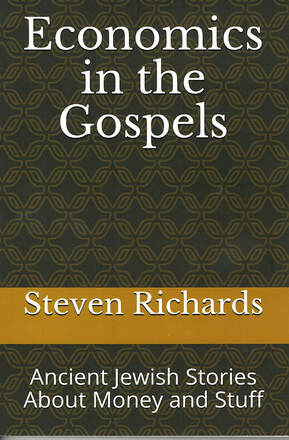 We are writing to you about this week’s free Kindle promotion of the Economics in the Gospels book as we celebrate the launch of our 10-part video course by the same name. Just go to the Amazon link here for your free copy. This study is particularly relevant not from a theological or economics point of view, but rather from the ecological, which is really what drives all we do at TheoEco. Why? It seems very unlikely that the Spirit (God, Goddess, Deity, The Force, Guardian Spirit, etc.) does not have a role in our economics. This leads one to wonder what its role is in the environmental struggles the world is increasingly experiencing. Jesus an economic actor? Most definitely, as the Gospels, and this study, clearly show. And with Christianity the theology at the center of Capitalism, it follows that Christianity is at the center of Capitalism’s ecological impact. In other words, Christianity is manifesting itself in the destruction of the world’s environment, and Jesus is somehow at the center, contrary to the examples he demonstrates in the scriptures. It begs the question then: What if we acted a little more like Christ did when it comes to our economic practices? It seems obvious that a lifestyle more like Jesus would yield a healthier life for most people and an improved communion between mankind and the earth. This study is an attempt to show how Jesus might see things differently than we do now - with the hope of bending the curve just a bit for those who want to live more like Christ. We hope you’ll take us up on this offer (the study is a “quick read” and you will likely know most of the passages} with an eye towards the environmentalist in you. Also, if you were contemplating signing up for the course this is a great time to peruse the study and give you and those in your orbit a chance to get the Kindle version (a $9.99 value) which will come in handy while taking the course. This limited time offer ends Friday, October 16th.  The Economics in the Gospels Video Course came out of the visiting professor role I play at the National Theological College in Kathmandu. I needed a video-based alternative to the Skype course I was hosting as the internet connections are too often broken – and I’m too often wishing I were still sleeping at 4 AM, to teach the class. So, we pulled together a crew and a willing class at my home church: St. Luke’s the Physician Episcopal (Anglican) Church in Miami during the summer of 2019. I found St. Luke’s via Google (I searched for the closest Episcopal Church to my new home) and walked over one Sunday shortly after the Charleston Church shooting in June 2015. It is located just a few miles from the house I grew up in in Kendall. Turns out that this Episcopal church, in an affluent (largely white that is) suburb of Miami, finds many (most) of its members are Anglican church transplants/descendants from Jamaica and other Caribbean Islands, Nigeria and other African nations, and various Hispanic countries. Like Miami it is a melting pot and WASP’s like me are in the happy minority. The Ladies: Carol, Deb, Gale, Joan, Orinthia, Salome (and Phillip) offer excellent commentary and questions and make the sessions work. There was another: Reverend Cori, who was instrumental in setting all this up. But she went on vacation shortly after the shoots began and is no longer at St. Luke’s, so we decided to edit her out. (Her sessions will be included as two bonus videos later on). So, viewers will perhaps notice that I am the only white guy in this group. In fact, I am the only white person period since we edited Reverend Cori out. Unfortunate, but it reflects the makeup of our congregation I suppose. These very nice people accepted me into their congregation years ago and it is a way to help the church as it is small and can use the money (20% of all video revenues go to St. Luke’s). Here’s what Deb had to say when she saw the trailer: “Just saw the video. LOVE IT!!!!!!! The video was edited splendidly!!!” The Ladies were a great class.. They came every week, stayed long, and remained engaged. They offered their questions, their comments, and we had a lot of fun – and for my students in Kathmandu the Ladies are the best part of each class. |
Archives
June 2024
Categories
All
|
TheoEco Institute is a 501(c)(3) nonprofit organization. Contributions to TheoEco in the United States are tax exempt to the extent provided by law.

 RSS Feed
RSS Feed